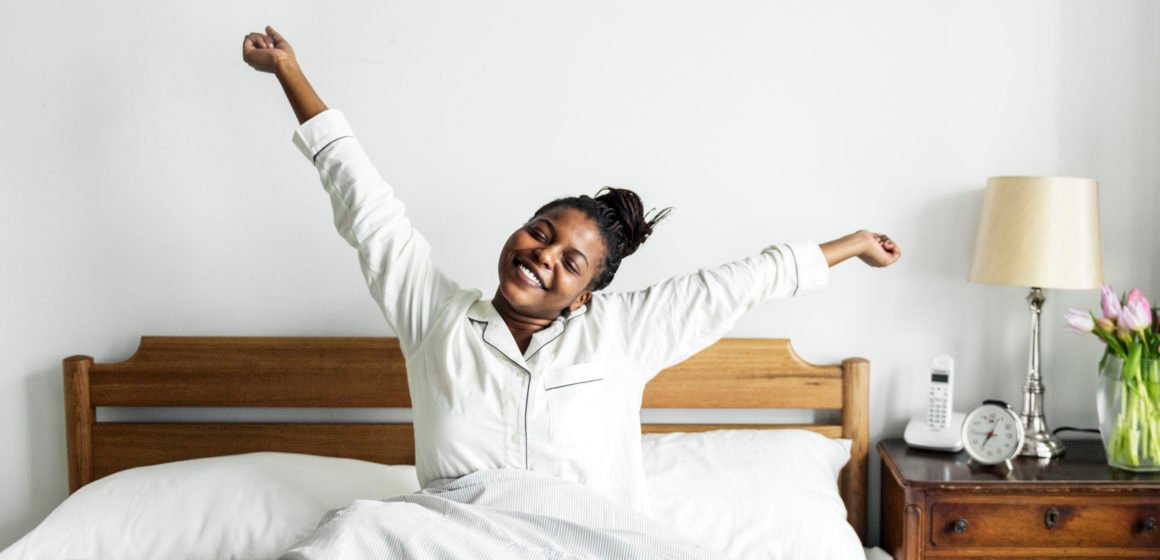Sleep: How to utilize it for Reducing Stress
Cultivating healthy sleep is important; better sleep enables us to navigate stressful times better in the short term, lowers our chance of developing persistent sleep problems in the longer term, and gives our immune system a boost.
Daytime tips to help with sleep
Keep a consistent routine.
Get up at the same time every day of the week. A regular wake time helps to set your body’s natural clock (circadian rhythm, one of the main ways our bodies regulate sleep). In addition to sleep, stick to a regular schedule for meals, exercise, and other activities. This may be a different schedule than you are used to, and that is okay. Pay attention to your body’s cues and find a rhythm that works for you and that you can maintain during this “new normal.” Make this a priority for all members of your household.
Get morning light.
Get up, get out of bed, and get some light. Light is the main controller of the natural body clock, and regular exposure to light in the morning helps to set the body’s clock each day. Natural sunlight is best, as even cloudy days provide over double the light intensity of indoor lighting. If you are living in an area with shelter-in-place, try to expose yourself to natural light by stepping outside, at a distance from others, for at least 20 minutes.
Exercise
Exercise during the day helps improve your sleep quality at night, reduces stress, and improves mood. Fit in exercise as best as you can. If you need to go outside for exercise, maintain proper social distancing at least six feet away from others. Avoid any group exercise activities, especially contact sports. Many gyms and yoga studios are now “at home” and offering virtual programs at low or no cost.
Don’t use your bed as an escape.
While the gravity of the pandemic certainly makes us all tired, try not to spend too much time in bed during the day, especially if you are having trouble sleeping at night. If you must take a nap, try to keep it short — less than 30 minutes.
Help Others
Helping others may help with feelings of uncertainty or unease. If you would like to be more actively involved in helping people, seek out ways to contribute your skills, donate money, or leverage your social capacity locally, such as providing virtual social connection to your loved ones by checking in on elderly family members or a friend, or providing in-kind donations. Doing altruistic acts may provide a sense of purpose, reduce helplessness, and alleviate some of the uncertainty contributing to sleep problems.
Nighttime tips to help with sleep
Prepare for bedtime by having a news and electronic device blackout.
Avoid the news and ALL electronics at least one hour before bedtime. Avoid the news and ALL electronics at least one hour before bedtime. (Yes, it’s so important, I am saying this twice!) The nonstop news cycle seldom provides new information in the evening hours that you can’t wait until morning to hear, and will likely stimulate your mind or incite fear, making it harder to fall and stay asleep. Remind yourself by setting a timer or putting your television on the sleep setting. Make a pact with your family members to respect these parameters.
Cell phones, tablets, and all electronic devices make it harder for your brain to turn off, and the light (even dim light) from devices may delay the release of the hormone melatonin, interfering with your body clock. If you need something to watch to help you unwind, watching something that you find relaxing on TV from far away and outside the bedroom is likely okay for a limited time. You can also curl up with a book or listen to music.
Set a regular bedtime.
There are certain times at night that your body will be able to sleep better than others. If you feel sleepy but your brain is busy thinking, it can’t shut off and go to sleep. It may be helpful to sit down with a pen and paper in the evening and write down the things that worry you; you can review this list in the morning and attend to any important concerns. If you have a bed partner, enlist their support to helping you stick to your schedule.
Reduce stress.
The evening and bedtime hours are also a good time to perform some relaxation techniques, such as slow breathing or yoga. There are many free resources available for bedtime meditation.
Don’t spend too much time in bed.
Minimize spending time in bed in which you are not sleeping. If you are having trouble going to sleep or staying asleep, don’t stay in bed for more than 20 minutes. Get out of bed and do a quiet activity — read a book, journal, or fold some laundry.
For this and much more Information relating to employability skills, employment opportunities, career advancement and entrepreneurship development; Join our Telegram and WhatsApp groups, and also follow us on Twitter and Facebook.
Culled from: Health Harvard.




